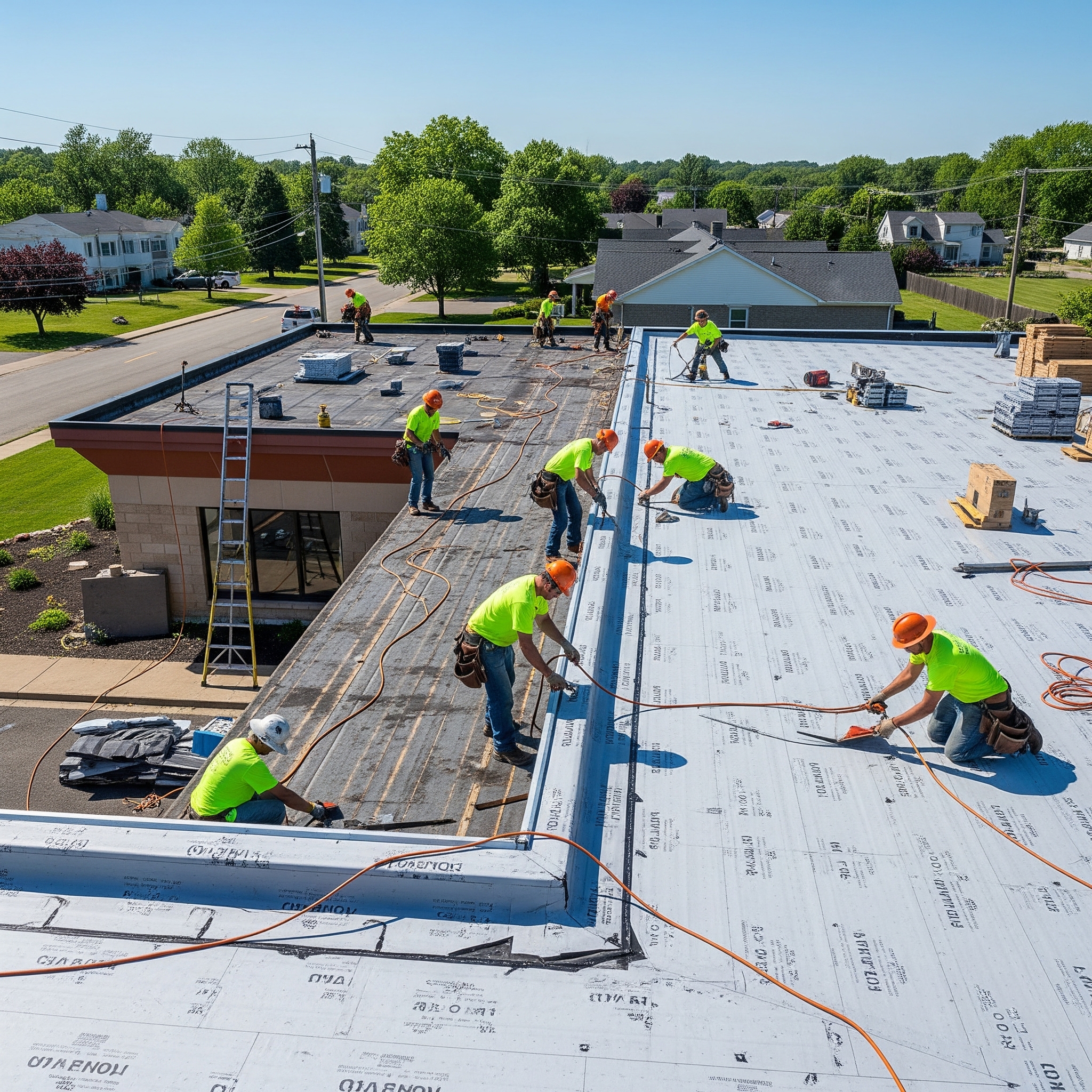Flat roofs are a popular choice for both residential and commercial properties across New Jersey due to their modern look, space efficiency, and cost-effectiveness. However, when a flat roof reaches the end of its life, selecting the right replacement option becomes crucial for long-term performance, waterproofing, and energy efficiency.
At American Roofing Pros New Jersey, we specialize in flat roof replacement and installation. In this post, we’ll walk you through the best flat roofing materials available, how to choose the right one for your property, and what to expect during the replacement process.
📞 Need expert advice or a free quote? Call us today at (877) 228-1042
🔗 Request your free estimate here
Common Flat Roof Issues That Require Replacement
Flat roofs tend to have a shorter lifespan than sloped roofs and are more prone to issues like:
-
Water pooling and leaks
-
Cracked or blistered membranes
-
UV damage
-
Poor drainage
-
Flashing deterioration
If your flat roof shows signs of extensive wear, has persistent leaks, or is more than 15–20 years old, it’s time to consider replacement.
Best Flat Roof Replacement Options
Choosing the right flat roofing system depends on your budget, building use, insulation needs, and maintenance expectations. Here are the most common and reliable options for New Jersey homeowners and business owners:
1. EPDM (Ethylene Propylene Diene Monomer)
EPDM is a synthetic rubber membrane known for its durability and ease of installation.
Pros:
-
Lightweight and flexible
-
Excellent resistance to UV radiation
-
20–30 year lifespan
-
Affordable material and installation cost
-
Minimal maintenance
Cons:
-
Black color absorbs heat (white-coated options available)
-
Can be punctured easily without a protective layer
Best For: Budget-friendly installations on residential additions or commercial buildings.
2. TPO (Thermoplastic Olefin)
TPO is a single-ply membrane system made from thermoplastic material, popular for energy-efficient roofing.
Pros:
-
Highly reflective white surface reduces energy costs
-
Resistant to mold, algae, and punctures
-
Heat-welded seams create a strong waterproof barrier
-
20–30 year lifespan
Cons:
-
Performance can vary depending on manufacturer
-
More sensitive to installation errors
Best For: Homes or commercial buildings looking for energy efficiency and a clean, modern appearance.
3. PVC (Polyvinyl Chloride)
PVC roofing is similar to TPO but with added chemical resistance, making it ideal for restaurants or industrial buildings.
Pros:
-
Excellent resistance to chemicals, grease, and oils
-
Heat-welded seams for durability
-
Energy efficient and long-lasting (20–30 years)
-
Flame-retardant properties
Cons:
-
Higher cost compared to EPDM or TPO
-
Can become brittle over time in colder climates
Best For: Commercial kitchens, flat-roofed homes, and buildings with rooftop HVAC units.
4. Modified Bitumen
Modified bitumen is an asphalt-based membrane, often reinforced with fiberglass or polyester for added strength.
Pros:
-
Durable and weather-resistant
-
Can be applied with a torch-down or peel-and-stick method
-
Suitable for low-slope or flat applications
-
15–25 year lifespan
Cons:
-
Heat application can pose fire risk (torch-down method)
-
More prone to seams and leaks than single-ply membranes
Best For: Property owners looking for a traditional flat roofing material with solid performance.
5. Built-Up Roofing (BUR)
BUR is the classic “tar and gravel” system made by layering hot asphalt and roofing felt.
Pros:
-
Extremely durable
-
Multiple waterproof layers
-
UV-resistant top layer of gravel
-
Fire-resistant
Cons:
-
Heavy weight requires reinforced roof deck
-
Labor-intensive installation
-
Messy and smelly during application
Best For: Large commercial flat roofs where longevity and durability are top priorities.
Factors to Consider When Choosing a Flat Roof
When selecting a replacement option, consider the following:
-
Budget: Material and labor costs vary widely
-
Building use: Residential vs. commercial performance needs
-
Weather resistance: Ability to handle NJ snow, rain, and temperature changes
-
Energy efficiency: Light-colored, reflective surfaces can lower cooling bills
-
Maintenance needs: Some materials require more upkeep than others
-
Warranty: Look for products backed by strong manufacturer warranties
Need help making the best decision? Request a free consultation and we’ll guide you through it.
What to Expect During a Flat Roof Replacement
-
Inspection & Estimate – We examine your current roof and discuss your goals
-
Material Selection – Choose the best flat roofing system for your needs and budget
-
Tear-Off (if needed) – Removal of the old roofing material
-
Surface Prep – Cleaning, leveling, and priming the roof deck
-
Installation – New membrane installed using proper method (adhered, fastened, or welded)
-
Flashing & Sealing – Attention to penetrations and edges
-
Final Inspection & Cleanup – We leave your site clean and your new roof watertight
Why Choose American Roofing Pros New Jersey?
We are a trusted, local roofing company with extensive experience in flat roof systems. Whether you’re upgrading your home, replacing an aging commercial roof, or dealing with leaks, we offer:
-
Expert installation of all major flat roofing systems
-
Licensed, insured, and experienced crews
-
Full warranties and competitive pricing
-
Free quotes and honest recommendations
📞 Call now at (877) 228-1042
🔗 Click here to request your free estimate
Final Thoughts
Flat roofs can offer reliable protection and modern appeal when properly installed and maintained. With several excellent material options to choose from, it’s important to work with professionals who understand New Jersey’s climate and local building codes.
Let American Roofing Pros New Jersey help you make the right choice and ensure a smooth, stress-free replacement process.
